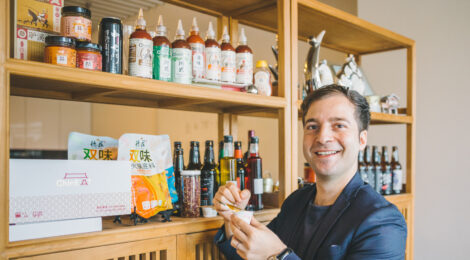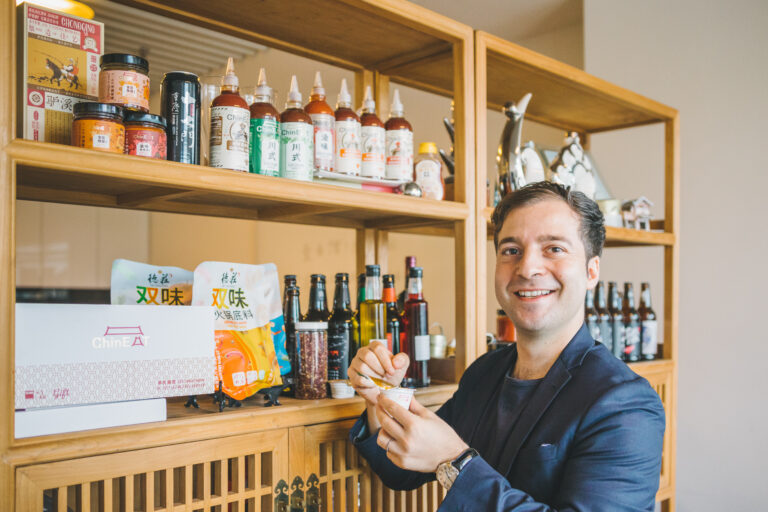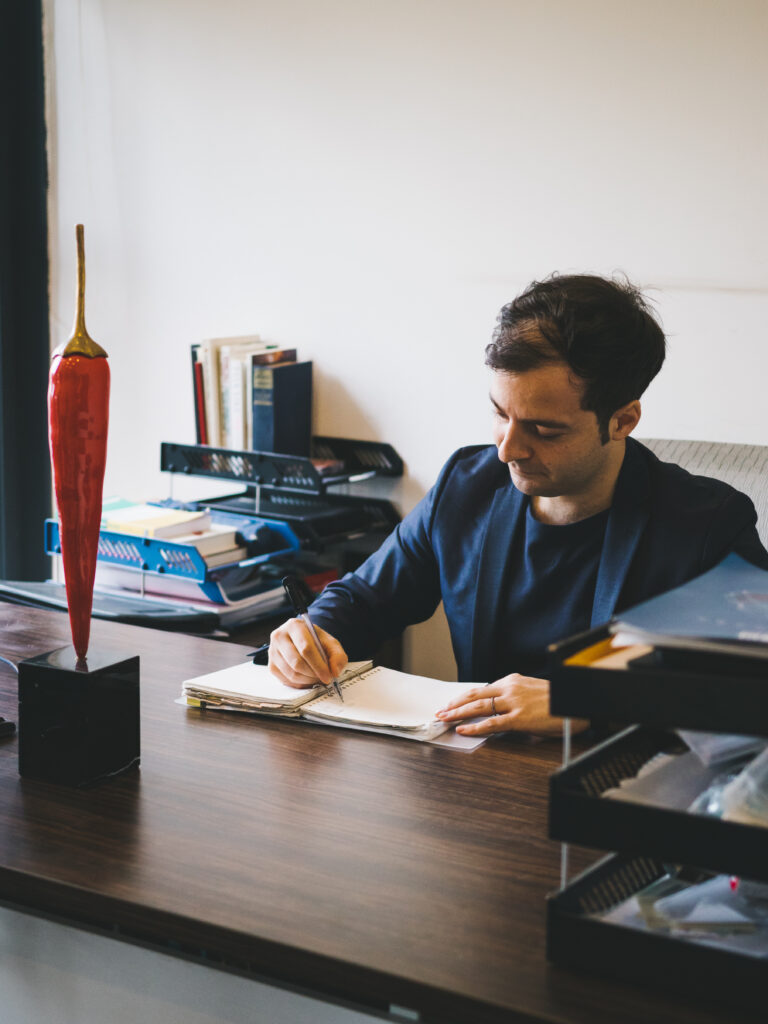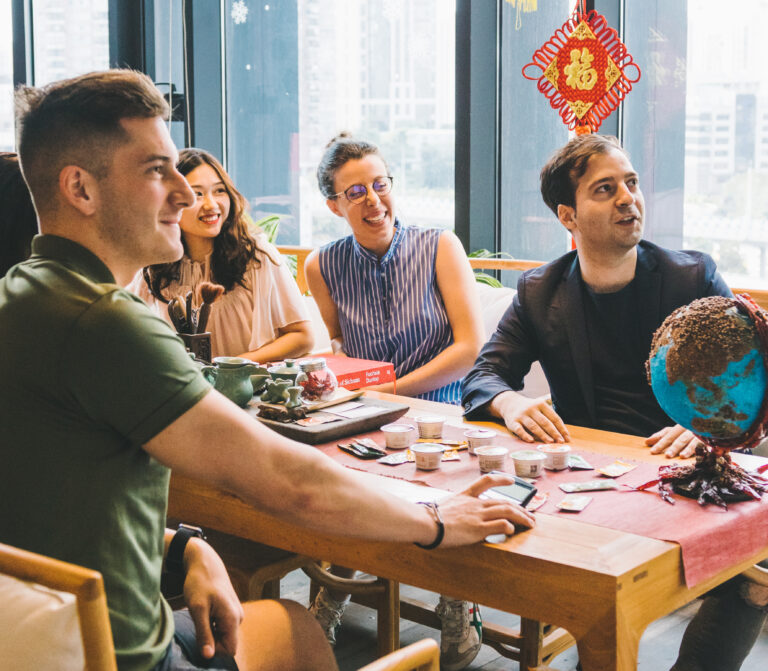
Galilei Circle of Friends – Interview with Gianluca Luisi

Gianluca Luisi, originally from Canosa di Puglia, a small town in the beautiful South of Italy, began his career abroad very young starting from the UK, where he took a bachelor course in International Trade with Chinese at Westminster University. During his studies in the UK, he spent one year as an exchange student in China, where he took classes at the Guanghua Management School of Peking University. After graduation, he headed straight back to Peking University where he obtained a master’s degree in International Political Economy (Chinese-taught course).
Driven by his interest in doing something meaningful for Italy in a foreign country, he moved to Chongqing where, at that time, our country had just established a new diplomatic-consular presence. He worked there for almost four years, experiencing in the front lines the establishment of an Italian official presence in the dynamic south-west of China. Nowadays, he keeps himself busy with his entrepreneurial activities between Chongqing, Chengdu, Italy and the world, and he serves as a Board Member (South-west representative) for the Italian Chamber of Commerce in China.
 Mister Luisi at his “ChinEAT” Office, located in Nan’An District, where he welcomed us
Mister Luisi at his “ChinEAT” Office, located in Nan’An District, where he welcomed us
Why did you decide to start a Food Trading Company?
After all these years in China, I have become aware of the many business opportunities that could be established between the two countries. At the same time, I have also acknowledged many of the difficulties that companies are likely to encounter while embarking themselves upon business adventures in foreign countries.
Business environment, indeed, is not just about numbers. It is also related to local languages, cultures, networks, management, risk projections and long-term planning. I thought it would be a good idea to serve as a medium for this cooperation potential, and I thought that food could really be the best medium for enhancing dialogue between people. On one hand, while Italian food companies are eager to settle down in the dynamic Chinese market, they find it hard (and expensive) to understand market dynamics in China. On the other hand, some Chinese food companies, after long years of growth and business model’s improvements in their domestic market, are now ready for international expansion. They are also very eager in letting the world understand the value and, of course, the flavours of the Chinese food culture.
DeZhuang International is the company I have set-up, together with my Chinese Partner, in Chongqing, and which works as a sort of bridge between world food concepts, with special attention to Italy and China. At the same time, I have launched a new brand “ChinEAT’’ through which I hope to contribute to the internationalisation of real, qualitative, Chinese food.

Gianluca Luisi working at his desk
Can you tell us more about ChinEAT, how did this brand start? Which is the mission of this brand?
ChinEAT was the natural result of me looking for a medium to communicate and talk about China to my friends and to the world, without having to get into complex and sometimes boring historical explanations. I thought food could be a great tool for uniting people on some common grounds as it represents the very foundation of civilization.
Since you already introduced ChinEAT, what’s your role inside the company?
I try to fill in the gaps as we are still in the start-up stage of this project, but I tend to keep myself busy with keeping the vision on the right track, developing products, recipes, and marketing campaigns. ChinEAT is growing a lot, and we shall never give up on keeping personal and strong relations with our partners worldwide. But of course I’m not alone in this project and I feel proud of the support of each team member, co-founders and key personalities who, by joining the mission, joined a dream.
You’re also the face of many promotional videos. Going back to ChinEAT, in the three years since its birth, are you proud of this project?
This project now has its own identity, and I have many precious memories that keep me emotionally connected to ChinEAT. For instance, coming up with the name and the logo.
And, you see, we often talk about what we do in and for the ChinEAT, but seldom refer to what ChinEAT does for us, the people. I love the fact that ChinEAT has actually been able to create jobs, and also to create a vision that is now attracting talents from all around the world.
To answer your question. Yes, I’m very proud. But this is just the beginning. We aim to become the leading Chinese condiments brand outside China, keeping our authentic DNA while bringing in our own ideas and innovations along the motto: Taste of China 2.0. Challenges come from trying to stay at pace with innovation, food is constantly evolving together with societies, and we want to stay focused, embracing more environmentally friendly, sustainable, and healthy concepts.
ChinEAT was born with the motto: “Connecting the dots between you and authentic Chinese cuisine”. How would you explain it to our friends?
There is a huge gap between authentic Chinese food and the outside world. Chinese food overseas is often portrayed with stereotypes and myths that are completely disconnected with the foundations of this millenary food culture. The dots are the steps we are making in getting our audience closer to the authenticity of this food culture. The “you” here wants to align our team’s efforts in addressing the needs of our community when talking about Chinese food. We try to do this by staying connected with our audience, keeping these interactions at a human-to-human level.

Gianluca Luisi with his team in Chongqing
Before starting this career, you were in charge of the commercial office at the Consulate General of Italy in Chongqing. Could you tell us about your experience there and if in some way that job has influenced the choice of the current one?
The years at the Consulate General of Italy in Chongqing were undoubtedly among the toughest years of my life, yet the most interesting and enriching ones.
In the very beginning there were only four of us in the office, however, it was not like a company start-up phase, when you are trying hard to get your products/services into a precise market segment. We did have a precise mission, but a much bigger outlook, which was promoting our country in an unfamiliar place, while establishing official dialogues with local authorities and paving the way for potential business projects. We had to start from scratch, and we had to set our standards. We wanted to make a difference in the south-west, knowing that many other countries had established their diplomatic-consular presence there years before.
The approach of the former Consul General, Sergio Maffettone, to diplomacy was very inspirational and it kept us fully committed throughout those years. I was working on almost everything from the secretary office, translation and interpreting tasks, to media affairs, cultural events and commercial projects.
Having the opportunity to meet high level political and commercial delegations from both sides enabled me to gain a very in-depth understanding of Italy-China’s bilateral relations and I felt honoured to make my contribution within this important framework.
I still remember getting a front-page article on local newspapers (often reserved for the latest political affairs news) picturing the Consul General and myself watching football matches with Chongqing friends. The article’s title was: “Italian consul invites Chongqing fans to watch the World Cup”. It was indeed a great way to say that Italy was here, and that we were open to the local environment.
In Chongqing, you often hear a saying: “接地气 (Jiēdì qì)” which means “get local” which has a very positive meaning. I think that this would be a good start for any entry strategy of foreign commercial presence in Chongqing.
Being in charge of the Commercial Affairs Office helped me understand the problems that Italian and Chinese companies faced when internationalising. I often find myself thinking that south-west China was not missing Italian entrepreneurs, but rather bridges which could really help create mutual understanding.
When an Italian company wants to enter the Chinese market, how much does the contribution of a Chinese partner affect the business?
I think that the choice of a good local partner is crucial for long-term success in the Chinese market. No matter if we are talking of a WFOE or a Joint Venture, to some extent you still need to build up strong partnerships with local entities/individuals.
The most difficult bit is actually getting the right partner in the first place and working out a medium-term commitment plan from the very beginning (even though you might want to leave margin for flexibility during the process – something very appreciated by Chinese entrepreneurs too). Another key element is actually assessing your own capability and assets before negotiating the business terms. What is in it for them? What is in it for you?
In addition to that, problem-solving with local partners might require a few more dinners rather than email exchanges. You might want to get ready for that.
Personally, my difficulty was coming up with something original and significant not only for Italy, but also for China. I wanted to come up with something that could really create added value within a mutual and fair exchange.
Is Chongqing still an opportunity? What advice can you give for those who want to invest here?
Chongqing plays a very important role in many of China’s national strategies within the south-west region, and it is growing faster than many other provinces. Central government investments in infrastructures and in new emerging sectors are giving rise to new pilot projects and are changing the shape of the local economy. Things might get really fast here.
Important industrial clusters in the automotive, IT, aviation, transportation, pharmaceutical, agriculture sectors and other fields make Chongqing a great destination for investment activities.
Consumers’ spending power is also steadily increasing, paving out the way for many commercial opportunities (export, retail and e-commerce) in the lifestyle sectors (furniture, food, fashion, cosmetics and other consumables).
Despite these competitive advantages, it is still important for foreign companies to get familiarised with the local business environment before establishing an efficient entry market strategy. You might want to adjust the management skills as well as the micro and macro management models, stick-and-carrot techniques work quite differently in this market.
In addition, working closely with our institutions locally (Consulate General and Chamber of Commerce) is likely to help you gain valuable information about the latest ongoing projects and market trends.

Gianluca and his sino-italian team in Chongqing
Chongqing and Chengdu maintain a kind of rivalry for a long time. In which of the two do you notice a greater level of internationalisation and why do you think that?
Good question. I do hope my wife will never read this interview. Yes, these two cities are competing with each other, to various extents, in many areas. As far as the internationalisation process is concerned, Chengdu had an early start, taking advantage from being the capital city of a province with a population of over 100 million people. Pandas did their contribution. Many international events took place in Chengdu recently, giving it great visibility globally.
Yet, Chongqing is catching up quickly.
Think about the latest tourism figures: Chongqing’s recently ranked second in the national ranking for domestic tourist destinations right after Beijing. It means that local people are recognizing more and more the uniqueness of this city. Not for the pandas, but maybe for hot-pot (a culinary tradition whose invention is also claimed by Chengdu, of course).
Internationalisation does not happen in a vacuum either. Each city, each territory has its own unique path. I think that Chongqing is encouraging market access to foreign companies (economic incentives might help, but I think that international talent recruiting might also be an issue the government would have to be looking into), while promoting the creation of “local” international brands. This last point could also be a good area for intervention by our Italian companies, considering our extensive competences in creativity and design. Having the honor of being a Board Member of the Italian Chamber of Commerce in China, I feel the challenge of supporting this Municipality in this mission, bringing added value to Italian companies willing to invest in China and in Chinese companies willing to establish partnerships with our country.
For the future, do you have any further expansion projects in China or abroad?
Besides the projects with DeZhuang International, I have also launched a non-profit organisation called the World Chilli Alliance, through which I hope to contribute to the development of a more sustainable chilli industry while getting together the world’s “chilli-heads”, organising seminars, summits and festivals. I will be definitely focusing on e-commerce in the next few months together with the interesting business activities related to the digital economy.
Interview by Marco Bonaglia



